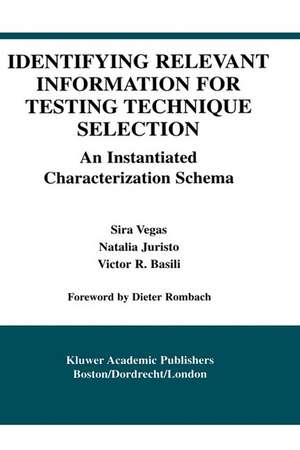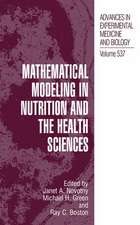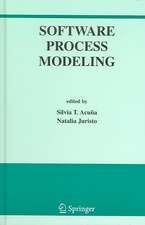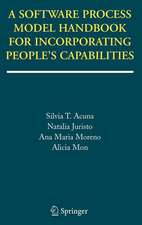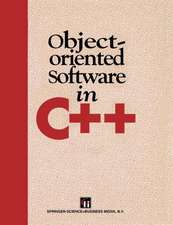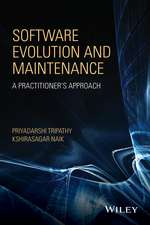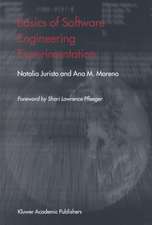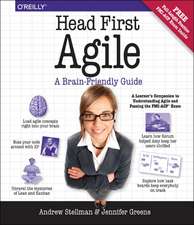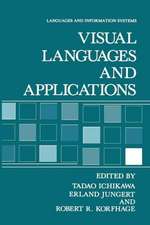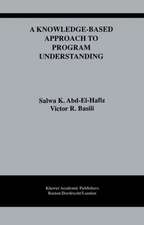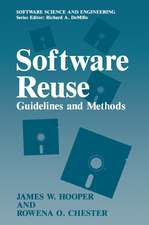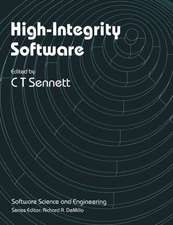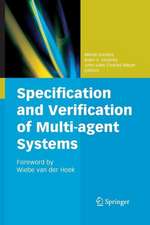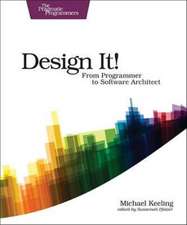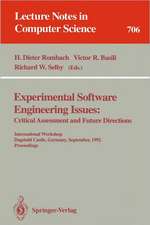Identifying Relevant Information for Testing Technique Selection: An Instantiated Characterization Schema: International Series in Software Engineering, cartea 8
Autor Sira Vegas, Natalia Juristo, Victor R. Basilien Limba Engleză Hardback – 30 apr 2003
| Toate formatele și edițiile | Preț | Express |
|---|---|---|
| Paperback (1) | 646.12 lei 43-57 zile | |
| Springer Us – 31 oct 2012 | 646.12 lei 43-57 zile | |
| Hardback (1) | 653.89 lei 43-57 zile | |
| Springer Us – 30 apr 2003 | 653.89 lei 43-57 zile |
Preț: 653.89 lei
Preț vechi: 817.36 lei
-20% Nou
Puncte Express: 981
Preț estimativ în valută:
125.16€ • 135.100$ • 105.20£
125.16€ • 135.100$ • 105.20£
Carte tipărită la comandă
Livrare economică 21 aprilie-05 mai
Preluare comenzi: 021 569.72.76
Specificații
ISBN-13: 9781402074356
ISBN-10: 1402074352
Pagini: 308
Ilustrații: XXIII, 281 p.
Dimensiuni: 155 x 235 x 22 mm
Greutate: 0.65 kg
Ediția:2003
Editura: Springer Us
Colecția Springer
Seria International Series in Software Engineering
Locul publicării:New York, NY, United States
ISBN-10: 1402074352
Pagini: 308
Ilustrații: XXIII, 281 p.
Dimensiuni: 155 x 235 x 22 mm
Greutate: 0.65 kg
Ediția:2003
Editura: Springer Us
Colecția Springer
Seria International Series in Software Engineering
Locul publicării:New York, NY, United States
Public țintă
Professional/practitionerCuprins
1. Introduction.- 1 Basics on Software Testing.- 2 The Problem of Selecting Testing Techniques.- 3 Getting a Characterisation Schema for Testing Techniques.- 4 Organisation of the Book.- 2. State of the Practice.- 1 Areas Surveyed.- 2 Testing Area.- 3 Area of Characterisation.- 4 Conclusions on the State of the Practice.- 3. Research Goals.- 1 Description of the Problem.- 2 Problem-Solving Approach.- 3 Hypotheses.- 4. Problem Solving Process.- 1 Research Methods.- 2 Objectives of Technological Research.- 3 Applying the Scientific Method to Technological Research.- 4 Expert Peer Review versus Experimental Testing.- 5 The Problem-Solving Process Used in this Book.- 5. First Generative Iteration: Deductive Theoretical Schema.- 1 Description of the Research Stage: Generation of a Theoretical Schema.- 2 Testing Process.- 3 Stratification of Testing-Related Information.- 4 Testing Process Elements.- 5 Attributes of the Theoretical Schema.- 6 Result of the Construction of the Theoretical Schema.- 7 Use and Evolution of the Characterisation Schema.- 6. Second Generative Iteration: Inductive Empirical Schema.- 1 Description of the Research Stage: Generation of an Empirical Schema.- 2 Data Collection.- 3 Data Analysis.- 4 Result of Building the Empirical Schema.- 5 Study of the Evolution of the Empirical Schema.- 7. Synthesis of Perspectives: Proposal of the Preliminary Schema.- 1 Description of the Research Stage: Synthesis of Schemas.- 2 Rules of Synthesis.- 3 Synthesis of the Theoretical and Empirical Schemas.- 4 Result of Schema Synthesis.- 5 Study of Schema Synthesis.- 8. Improvement of the Schema: Expert Peer Review.- 1 Description of the Research Stage: Improvement.- 2 Questionnaire for Experts.- 3 Questionnaire Analysis Method.- 4 Analysis of Responses.- 5 Improved Schema.- 9. Empirical Evaluation.- 1 Objective of the Empirical Evaluation.- 2 Choice of the Workload.- 3 Analysis of the Results.- 4 Conclusions on the Empirical Evaluation.- 10. Experimental Evaluation.- 1 Objective of the Experiment.- 2 Experiment Planning.- 3 Experimental Design.- 4 Data Analysis.- 5 Conclusions on Experimental Evaluation.- 6 Characterisation Schema Improvement.- 11. Conclusions.- Appendices.- Forms Used to Obtain the Empirical Schema.- Questionnaires Used in Expert Peer Review.- Schema Instantiation.- Experiment Forms.
